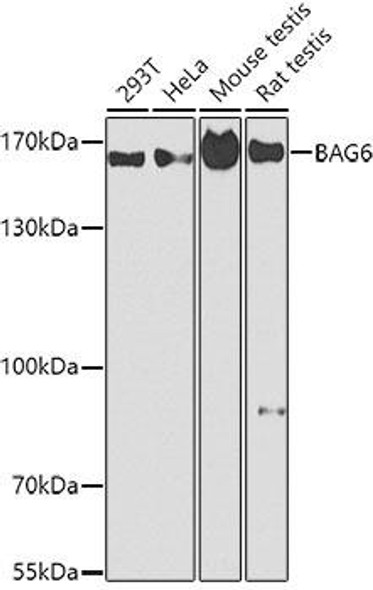Anti-BAT3/BAG6 Antibody (CAB19231)
- SKU:
- CAB19231
- Product Type:
- Antibody
- Antibody Type:
- Monoclonal Antibody
- Reactivity:
- Human
- Reactivity:
- Mouse
- Reactivity:
- Rat
- Host Species:
- Rabbit
- Isotype:
- IgG
- Synonyms:
- BAG6
- Synonyms:
- BAG-6
- Synonyms:
- BAT3
- Synonyms:
- D6S52E
- Synonyms:
- G3
- Synonyms:
- BCL2 associated athanogene 6
- Research Area:
- Cell Death
Description
| Product Name: | BAT3/BAG6 Rabbit mAb |
| Product Code: | CAB19231 |
| Size: | 20uL, 50uL, 100uL |
| Synonyms: | BAG6, BAG-6, BAT3, D6S52E, G3, BCL2 associated athanogene 6 |
| Applications: | WB |
| Reactivity: | Human, Mouse, Rat |
| Host Species: | Rabbit |
| Immunogen: | Recombinant protein of human BAT3/BAG6. |
| Applications: | WB |
| Recommended Dilutions: | WB 1:500 - 1:2000 |
| Reactivity: | Human, Mouse, Rat |
| Positive Samples: | 293T, NIH/3T3, C6, Mouse testis |
| Immunogen: | Recombinant protein of human BAT3/BAG6. |
| Purification Method: | Affinity purification |
| Storage: | Store at -20°C. Avoid freeze / thaw cycles. Buffer: PBS with 0.02% sodium azide, 50% glycerol, pH7.3. |
| Isotype: | IgG |
| Sequence: | Email for sequence |
| Gene ID: | 7917 |
| Uniprot: | P46379 |
| Cellular Location: | Cytoplasm, Nucleus, cytosol |
| Calculated MW: | 160kDa |
| Observed MW: | 155KDa |
| UniProt Protein Function: | BAT3: Chaperone that plays a key role in various processes such as apoptosis, insertion of tail-anchored (TA) membrane proteins to the endoplasmic reticulum membrane and regulation of chromatin. Acts in part by regulating stability of proteins and their degradation by the proteasome. Participates in endoplasmic reticulum stress-induced apoptosis via its interaction with AIFM1/AIF by regulating AIFM1/AIF stability and preventing its degradation. Also required during spermatogenesis for synaptonemal complex assembly via its interaction with HSPA2, by inhibiting polyubiquitination and subsequent proteasomal degradation of HSPA2. Required for selective ubiquitin-mediated degradation of defective nascent chain polypeptides by the proteasome. In this context, may play a role in immuno-proteasomes to generate antigenic peptides via targeted degradation, thereby playing a role in antigen presentation in immune response. Key component of the BAG6/BAT3 complex, a cytosolic multiprotein complex involved in the post-translational delivery of tail-anchored (TA) membrane proteins to the endoplasmic reticulum membrane. TA membrane proteins, also named type II transmembrane proteins, contain a single C-terminal transmembrane region. BAG6/BAT3 acts by facilitating TA membrane proteins capture by ASNA1/TRC40: it is recruited to ribosomes synthesizing membrane proteins, interacts with the transmembrane region of newly released TA proteins and transfers them to ASNA1/TRC40 for targeting to the endoplasmic reticulum membrane. Component of the BAT3 complex, at least composed of BAG6/BAT3, UBL4A and GET3/TRC35. Interacts with AIFM1, CTCFL, HSPA2 and p300/EP300. Interacts with ricin A chain. Interacts with L.pneumophila proteins Lpg2160 and LegU1. Interacts with NCR3. 3 isoforms of the human protein are produced by alternative splicing. |
| UniProt Protein Details: | Protein type:Chaperone; Cell cycle regulation; Apoptosis; Ubiquitin conjugating system Chromosomal Location of Human Ortholog: 6p21.3 Cellular Component: nucleoplasm; intracellular membrane-bound organelle; cytoplasm; nucleus; cytosol Molecular Function:protein binding; ubiquitin protein ligase binding; ribosome binding; Hsp70 protein binding; polyubiquitin binding Biological Process: negative regulation of proteolysis; ubiquitin-dependent protein catabolic process; synaptonemal complex assembly; internal peptidyl-lysine acetylation; protein stabilization; immune system process; chromatin modification; negative regulation of proteasomal ubiquitin-dependent protein catabolic process; regulation of cell proliferation; embryonic development; transport; spermatogenesis; brain development; cell differentiation; kidney development; DNA damage response, signal transduction by p53 class mediator resulting in induction of apoptosis; negative regulation of apoptosis; lung development |
| NCBI Summary: | This gene was first characterized as part of a cluster of genes located within the human major histocompatibility complex class III region. This gene encodes a nuclear protein that is cleaved by caspase 3 and is implicated in the control of apoptosis. In addition, the protein forms a complex with E1A binding protein p300 and is required for the acetylation of p53 in response to DNA damage. Multiple transcript variants encoding different isoforms have been found for this gene. [provided by RefSeq, Jul 2008] |
| UniProt Code: | P46379 |
| NCBI GenInfo Identifier: | 76800648 |
| NCBI Gene ID: | 7917 |
| NCBI Accession: | P46379.2 |
| UniProt Secondary Accession: | P46379,O95874, A2ADJ7, A3KQ42, A3KQ44, A6NGY6, A6PWF7 B0UX84, B4DZ12, B4E3V4, E7EMZ4, F8VXY4, |
| UniProt Related Accession: | P46379 |
| Molecular Weight: | 1132 |
| NCBI Full Name: | Large proline-rich protein BAG6 |
| NCBI Synonym Full Names: | BCL2-associated athanogene 6 |
| NCBI Official Symbol: | BAG6 |
| NCBI Official Synonym Symbols: | G3; BAT3; BAG-6; D6S52E |
| NCBI Protein Information: | large proline-rich protein BAG6; scythe; protein G3; protein Scythe; HLA-B associated transcript 3; HLA-B associated transcript-3; HLA-B-associated transcript 3; large proline-rich protein BAT3; BAG family molecular chaperone regulator 6 |
| UniProt Protein Name: | Large proline-rich protein BAG6 |
| UniProt Synonym Protein Names: | BAG family molecular chaperone regulator 6; BCL2-associated athanogene 6; BAG-6; BAG6; HLA-B-associated transcript 3; Protein G3; Protein Scythe |
| Protein Family: | BAG family molecular chaperone regulator |
| UniProt Gene Name: | BAG6 |
| UniProt Entry Name: | BAG6_HUMAN |






